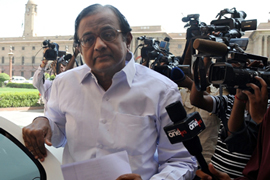Indian Maoists stage deadly raid
At least 75 paramilitary police killed after their bus is ambushed in Chhattisgarh state.

P Chidambaram, India’s interior minister, condemned the attack, saying it showed the “savage nature” of the Maoists.
“Something has gone very wrong. They seem to have walked into a camp or a trap,” he said, referring to the police force which came under attack.
Red Corridor
Indian authorities have launched an offensive against the Maoists entrenched in the forests of the so-called Red Corridor that stretches across north and eastern India.
The offensive, known as Operation Green Hunt, involves 56,000 paramilitary forces in six states, in addition to local police.
| IN DEPTH |
|
|
 Q&A: The Maoists of India Q&A: The Maoists of India India’s battle against the Maoists India’s battle against the Maoists Timeline Timeline |
Senior Maoist officials have said they will only negotiate if the government halts the offensive.
Ajai Sahni, a defence and security analyst in Delhi, said the attack shows gaps in the state’s strategy against the Maoists.
“This is an inevitable consequence of the incoherence of strategy of the bombers and the inadequate deployment of forces in the areas afflicted by the Maoist threat,” he told Al Jazeera.
“These are very, very small units, which are being thrown into the areas of conflict with very little support [and] very little possibility of reinforcement.
“The country has ignored policing for decades. The country has not maintained capacities in any kind of proportion to the threat, or to the population or to the area that needs to be managed.”
‘Biggest security threat’
The Maoists have been described by Manmohan Singh, the Indian prime minister, as the country’s biggest internal security threat.
They regularly ambush police and attack railway lines and factories, aiming to cripple economic activity.
The government recently hardened its rhetoric against the rebels after 10 policemen were killed in a landmine attack in the eastern Orissa state, with Chidambaram calling the rebels “cowards”.
 |
| Chidambaram said Tuesday’s attack showed the ‘savage nature’ of the Maoists [AFP] |
Rubina Khan Shapoo, a senior correspondent for India’s NDTV, said Tuesday’s attack will force Indian authorities to develop a new strategy against the rebels.
“For the past year the Indian government has been on the offensive, but there was talk of dialogue with the group to work out a peaceful solution,” she told Al Jazeera from Bhopal, a city in central India.
“But it seems that the [Maoists] were buying time. They have used the peace time to regroup and there has been a series of attacks. But after today’s incident the government is going to take a different strategy.
“Now the crackdown will be more severe – an all-out offensive.”
In February, at least 25 policemen were killed in the eastern state of West Bengal when Maoists attacked a camp. And in March 2007, the Maoists were blamed for an attack that killed 55 policemen, also in Chhattisgarh.
Tactics defended
In an exclusive interview with Al Jazeera last October, “Kishan-ji”, commander of the Maoists’ armed wing, defended the attacks, calling them necesary.
“Violence is directly related to the power of the state. Eighty-five to 90 per cent of the population lives under a dictatorship, it is not really a democracy,” he said.
“The state is running a terror campaign against the people, and we fight against anyone who is perpetrating terror against the common population, be it any political party or the armed forces.”
The Maoists are also known as Naxals, after their first armed uprising which took place in a small village called Naxalbari in the Indian state of West Bengal some 40 years ago.
